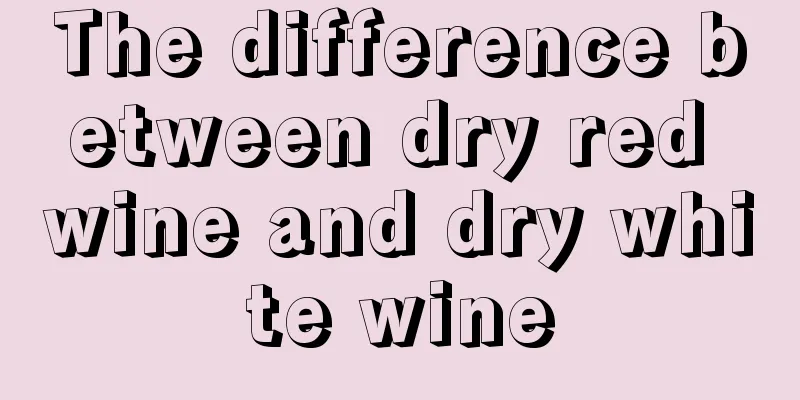The difference between dry red wine and dry white wine

|
Red wine is a relatively common type of alcoholic beverage, and it is also a type of alcoholic beverage that has certain benefits for human health. Of course, red wine is just one category of wine. There are many specific types of red wine. For example, dry red and dry white are two of the more common types of red wine. There are certain differences between the two types of wine in terms of brewing technology, color, and nutritional value.
In short, "dry red" is made by fermenting grapes with red skin and white flesh or both red skin and flesh with the skin on, fermenting the skin and juice together, and then separating and aging them; "dry white" is made by using white grapes or wine grapes with light-colored skin. After the skin and juice are separated, the juice is taken for fermentation and brewing. 2. Color Since "dry red" is made by fermenting grapes with red skin and white flesh or both red skin and flesh with the skin on, the wine contains colored substances from the skin or flesh, making "dry red" mainly red, and the colors are generally dark ruby red, ruby red, purple red, dark red, brown red, etc.; "dry white" is made from white skin and white flesh or red skin and white flesh grapes that are peeled and fermented, and its color is mainly yellow, mainly nearly colorless, slightly yellow with green, light yellow, straw yellow, golden yellow, etc. 3. Nutritional value The proportion of vitamin B, riboflavin, niacin, pantothenic acid and pantothenic acid contained in "dry red wine" is higher than that in "dry white wine". In terms of the tasting period, since "dry white" is brewed only with juice, its tannin content is relatively low, while "dry red" is brewed with peel, pulp and juice together, its tannin content is relatively high. Therefore, in general, "dry red" is more stable than "dry white" and has a longer tasting period. 4. Raw materials "Dry red" is made by fermenting a mixture of skins (including skins, seeds and stalks) and grape juice, while "dry white" is fermented with clarified grape juice. Therefore, during the fermentation process of red wine, alcohol fermentation and solid matter soaking exist at the same time. The former converts sugar into alcohol, and the latter dissolves phenolic substances such as tannins and pigments in the solid matter into the wine. Therefore, the color, smell, taste, etc. of red wine are closely related to phenolic substances. |
<<: Is Purslane cold in nature?
>>: What are the functions of the right brain
Recommend
There is crushed jelly-like mucus after urinating
Urination is a normal physiological reaction of t...
What is the cause of liver cancer? 6 ways to quickly help you prevent liver cancer
None of us want to get liver cancer because it wi...
Which department should I go to for lymphoma
Which department should I go to for lymphoma? Man...
The harm of pure food
Fasting food has a history of more than 5,000 yea...
Are ovarian tumors hereditary?
The cause of ovarian tumors is not very clear. Th...
What are the symptoms of lymphoma and what are the treatments and dietary therapies?
What are the symptoms of lymphoma? What is the di...
How should patients with nasopharyngeal carcinoma of Qi and blood deficiency eat tonic food?
Dizziness, pale or sallow complexion, dry throat,...
What are the treatments for testicular cancer patients
Testicular cancer is a common men's disease, ...
Method of using blister beetles to treat cattle ringworm
The method of using blister beetles to treat psor...
What are the tests for atherosclerosis
Atherosclerosis is very common in clinical practi...
What to do if you have abdominal distension after gastric cancer surgery
During gastric cancer surgery, the vagus nerve is...
What is the method to adjust the hairline
Adjustment of the hairline mainly refers to when ...
How should patients with ovarian tumors eat properly after surgery
Ovarian tumors are a common disease among women, ...
Eye cream suitable for 20-year-olds
Although 20 years old is still very young, it is ...
Reasons for sore and weak legs
Legs are an important part of the human body. We ...









